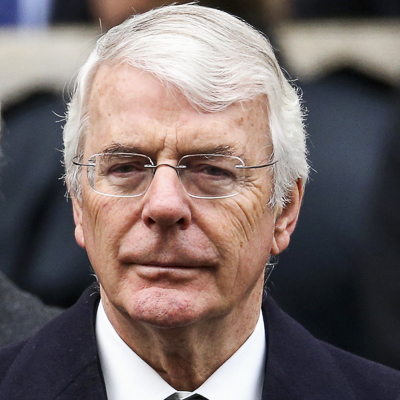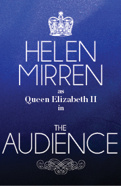Don't Know Much About (British) History? Check Out Broadway.com's Cheat Sheet For The Audience
Her Majesty has arrived! The Audience, Peter Morgan’s fictionalized account of Queen Elizabeth II’s weekly visits with her prime ministers, opens at the Schoenfeld Theater March 8 after a celebrated debut across the pond. Helen Mirren again portrays the monarch, this time holding court over a series of conversations with Prime Ministers Winston Churchill, Margaret Thatcher and more. Here’s a cheat sheet to give you a leg up on these royal sitdowns!

QUEEN ELIZABETH II
Played by Helen Mirren
Prince Harry and William’s grandma was named queen after the death of her father, King George VI, on February 6, 1952. She was officially crowned on June 2, 1953, a few months after her 27th birthday. Queen Elizabeth’s job is very ceremonial: attending events, reading letters from citizens, meeting with various politicians and dignitaries, and discussing daily and future business. It’s basically like a less klutzy version of The Princess Diaries. Among those duties is meeting with the current prime minister every Wednesday. Do they talk about horses, the Queen’s passion? We don’t know. Records are not kept and neither party discloses details.

WINSTON CHURCHILL
Played by Dakin Matthews
Years as Prime Minister: 1940 to 1945 and 1951 to 1955
Churchill is probably why the United Kingdom isn’t speaking German right now. During World War II, Churchill refused to follow former PM Neville Chamberlain’s accommodating attitude toward the Nazis. He got the political parties to work together and filled important positions with qualified hires. Most importantly, Churchill partnered with the United States and Soviet Union to defeat the Axis Powers, and even helped develop a strategy afterward. Still, the living icon—he was knighted and won a Nobel Prize for Literature—adored the far-younger queen. “I think my grandfather was platonically in love with her,” said Churchill’s grandson, Nicholas Soames. “As a beautiful young woman she embodied all his romantic ideas of monarchy.”

ANTHONY EDEN
Played by Michael Elwyn
Years as Prime Minister: 1955 to 1957
Before he turned 40, Eden was a World War I veteran, parliament member, and the foreign secretary for Chamberlain. Eden served the latter role again under Churchill on two separate occasions until 1955. Tabbed as the Conservative Party’s new leader, Eden’s political rise crashed in 1956—and it involved foreign policy! Eden, along with France and Israel, used military force against Egypt’s General Abdel Nasser, who had nationalized the Suez Canal. Just one problem: America wasn’t onboard. “Eden was left to face the humiliating fact that Britain was no longer a world power, and he was obliged to withdraw British forces,” according to the BBC. Oops! Predictably, Eden resigned in January 1957.

HAROLD WILSON
Played by Richard McCabe
Years as Prime Minister: 1964 to 1970 and 1974 to 1976
Wilson’s resignation in 1976 was a shock. Not only was he held in high regard—if you’re to believe Mirren, he was the Queen’s favorite—there was no Watergate or intern scandal hanging over his head. Wilson simply wanted to make room for the next wave. They had much to live up to. Under his watch, Wilson suspended the death penalty and legalized abortion (though under certain conditions). He also kept British troops out of the Vietnam War. “The immense popularity of Harold Wilson had been rooted in his plain style as well as in his flexible politics,” The New York Times observed in his 1995 obituary.

JAMES CALLAGHAN
Played by Tony Ward
Years as Prime Minister: 1976 to 1979
Here’s Wilson’s successor, a man whose name is regularly bandied about as Britain’s worst prime minister. (Some disagree.) Immediately, Callaghan had to deal with Britain’s trade unions and cut government spending. It went the exact opposite of well. His decision to halt union wage increases at five percent led to the Winter of Discontent of 1978-79, which “paralyzed hospital care, refuse collection, and other essential services,” according to The Encyclopedia Britannica. Even worse: in March 1979, Callaghan was issued a vote of no confidence by his own government, paving the way for an election against Margaret Thatcher. Take a wild guess how that went.

MARGARET THATCHER
Played by Judith Ivey
Years as Prime Minister: 1979 to 1990
Thatcher reversed the mess Callaghan left behind. Also, she was Britain’s first prime female minister, and the first elected to three terms. However, her historic reign was not all tea and crumpets. She led the British to victory in the Falklands War, but was nearly killed after the IRA planted a bomb at a Conservative Party conference. Her policies—including reforming trade unions and reducing social expenditures—helped lower inflation, but caused unemployment levels to skyrocket. And Thatcher actually resigned in the middle of her third term because her agenda (featuring the disastrous poll tax) clashed with fellow party members, who challenged her leadership. But when your life is turned into a movie starring Meryl Streep, you’ve done OK.

JOHN MAJOR
Played by Dylan Baker
Years as Prime Minister: 1990 to 1997
Talk about a tough act to follow. Major, the son of an ex-circus performer, actually did an OK job succeeding Thatcher. (He was knighted, an honor not bestowed upon the hopeless—we think.) Under Major’s regime, there was a temporary cease-fire between the Catholics and Protestants in Northern Island; plus, in the mid-1990s, unemployment and inflation decreased. Unfortunately, Major was never especially popular. Why? His first years in office occurred during an economic recession. Large tax increases did not endear Major to regular folk and neither did their perception of him as a “colorless and indecisive” leader. Ouch! Plus, the Conservative Party had been in power since 1979. Change was overdue. “It’s not you, it’s me” extends into politics!

TONY BLAIR
Played by Rufus Wright
Years as Prime Minister: 1997 to 2007
This guy had a lot of firsts: At the age of 41, the whippersnapper became the youngest-ever leader of the Labour Party when John Smith suddenly died of a heart attack. Then at 43, he became the youngest prime minister since Lord Liverpool in 1812, winning by the largest landslide in Labour Party history. Within months of taking office, Princess Diana died and as seen in Morgan's movie The Queen (which won Mirren her Oscar), Blair famously helped the Royal Family navigate the stormy waters caused by their initial public reaction to the death of "The People's Princess." It wasn't all smooth sailing for him though—in the first six years in office, Blair sent British troops to battle a whopping five times—the most of any prime minister to date.

GORDON BROWN
Played by Rod McLachlan
Years as Prime Minister: 2007 to 2010
Brown had the misfortune of being on board during the 2008 financial crisis leading to everything being not-so OK in the UK: massive unemployment, foreclosures, and a national budget deficit that would not go away. (Sound familiar, guys?) Brown might be forgiven for that, not so much the financial improprieties in Parliament and in his own cabinet. He certainly didn’t help matters by expensing 12,000 pounds in personal housecleaning and gardening services with parliamentary funds. His approval ratings dwindled. A change in power from the Labour Party to the Conservative Party, led to Brown’s 2010 resignation.

DAVID CAMERON
Played by Rufus Wright
Years as Prime Minister: 2010 to present
Queen Elizabeth’s latest chat buddy initially brought youthful optimism to his leadership role. Cameron became Prime Minister at 43, the youngest to hold the position since 1812. “I want to switch on a whole new generation,” he told the BBC in 2005. During his regime, Cameron has promoted gay marriage and formed a pact with Liberal Democrats, leading to the first coalition government since World War II. Cameron has been confronted with a cold blast of political reality. Currently, he is under fire for not reducing immigration into the UK, a promise he made five years ago that he has not kept.
